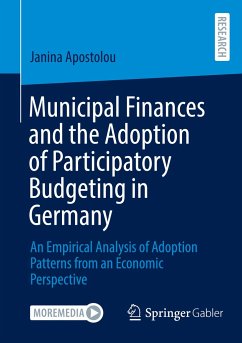Participatory Budgeting (PB) is one of the most popular democratic innovations of recent times. Since its first implementation in Germany in 1998, a growing number of municipalities have experimented with it. Unlike in other countries, PB processes in Germany follow primarily the goal of increasing transparency, efficiency, and service-orientation as part of an effort to modernize public administration. In global comparison, the diffusion of PB in Germany has been rather slow. In this book, the author investigates the question how this specific adoption pattern occurs. For that purpose, she applies theories from Public Administration, Fiscal Federalism, Public Choice, and diffusion of innovations to explain the incentives driving politicians to adopt PB from a public finance point of view. According to empirical analysis by the author, municipalities with a relatively worse financial situation are more likely to adopt a PB process. Consequently, PB processes seem to be used as a tool to spread responsibility, gain legitimacy, and raise understanding by citizens for necessary budget cutting decisions.
Bitte wählen Sie Ihr Anliegen aus.
Rechnungen
Retourenschein anfordern
Bestellstatus
Storno








